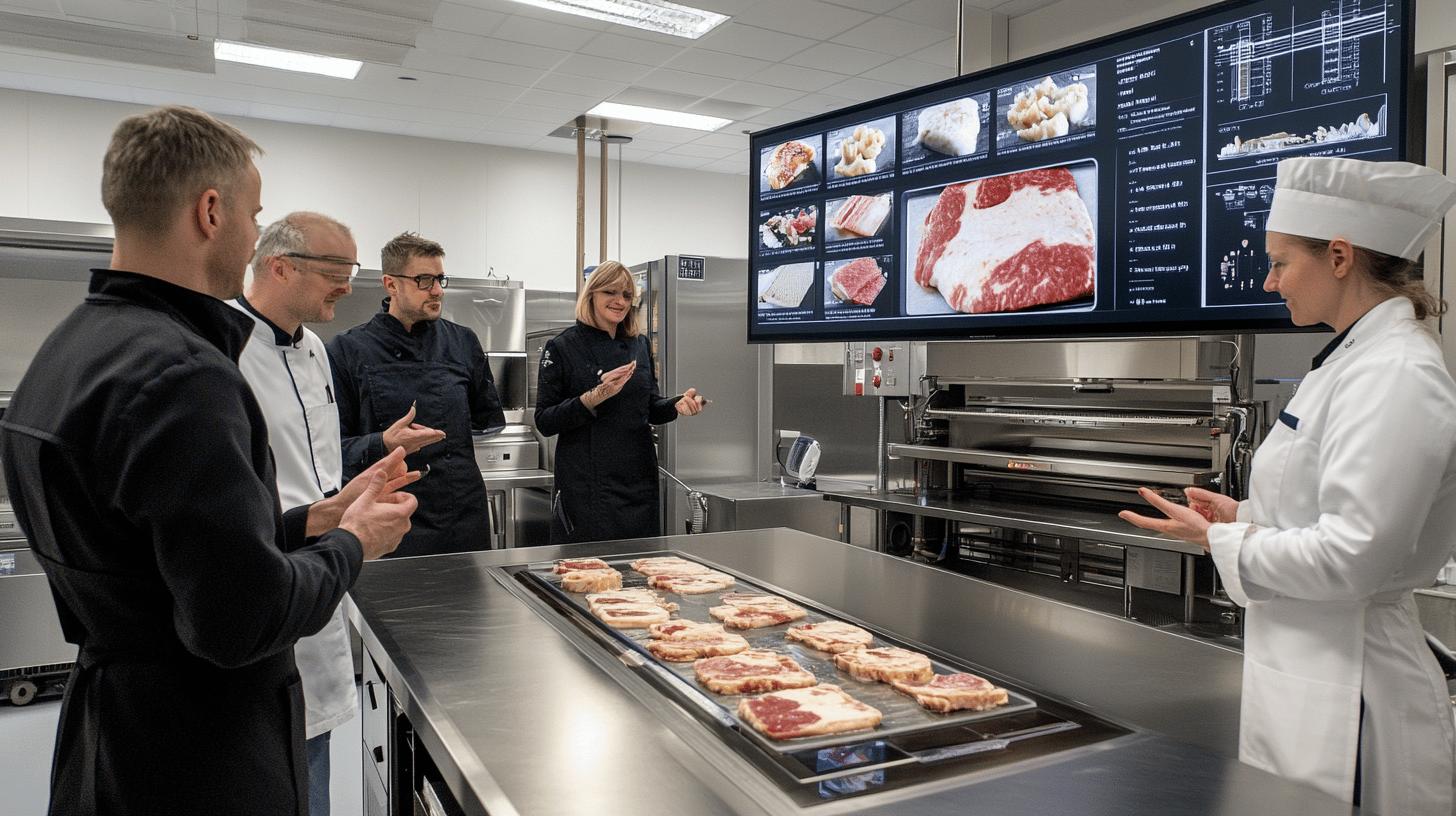
Data Management Solutions Elevate Food Sector Training


Data Management Solutions Elevate Food Sector Training

How Data Management Solutions Enhance Training and Competence Frameworks in the Food Sector
Data management solutions are revolutionising how training and competence frameworks function in the food sector. Nearly one-third of food and drink industry businesses still rely on paper-based records or basic spreadsheets, creating significant inefficiencies and compliance risks. Digital alternatives like competency management systems are filling this gap by actively tracking skills, automating training processes, and providing actionable insights for workforce development. With 25% of respondents rating their training programmes as poor and over one-third believing these programmes fail to impact staff retention, the shift to digital frameworks is becoming increasingly vital.
Transforming Food Safety Training Through Digital Innovation

Modern data management solutions offer game-changing capabilities for food businesses struggling with outdated training systems. These platforms provide real-time performance tracking, automated certification management, and targeted skill development tools that align perfectly with operational goals and regulatory requirements.
The transition from paper-based systems to integrated digital platforms has reduced our compliance-related penalties by 20% while significantly improving audit readiness across all departments. Source: Mid-sized food manufacturing company case study
By implementing these solutions, food businesses can create training frameworks that not only ensure compliance but also drive measureable improvements in workforce capability and operational efficiency. Q-Hub's comprehensive software solutions specialise in exactly this kind of digital transformation, helping food sector businesses streamline their training processes while maintaining rigorous compliance standards.
Essential Features That Drive Food Sector Excellence
Effective data management systems for the food industry combine several critical capabilities that traditional methods simply cannot match. These features work together to create a comprehensive framework for competence management and compliance assurance.
The most impactful data management solutions integrate these key elements:
- Automated training progress tracking: Real-time monitoring ensures no certification or compliance deadline is missed
- Competency evaluation modules: Tools that assess employee skills against role requirements, enabling targeted development
- Skill gap analysis and reporting: Identifies discrepancies between current competencies and required standards
- Seamless integration capabilities: Connects with existing HR and operational systems to eliminate data silos
- Compliance tracking automation: Monitors safety-critical roles and ensures adherence to food safety regulations

These features aren't merely convenient—they're transformative for food businesses facing complex compliance requirements. For instance, automated compliance tracking significantly reduces the risk of certification lapses, while skill gap analysis enables targeted training interventions that enhance workforce capability and confidence.
Building a Culture of Compliance Beyond Checkboxes
Digital data management tools do more than just track compliance—they help foster a genuine culture of food safety excellence. By automating routine tasks and providing actionable insights, these systems free up time for more meaningful training and development activities.
Modern compliance software in the food sector works by streamlining critical processes such as food safety training management and regulatory compliance tracking. Instead of manually monitoring training logs or certification renewals, these systems send automated alerts when deadlines approach, ensuring nothing falls through the cracks.
This approach transforms compliance from a box-ticking exercise into a continuous improvement process. Programmes that integrate with these management systems help businesses track cultural shifts, identify improvement areas, and measure progress with reliable data. The result is a workforce that truly understands and embraces food safety principles rather than simply following procedures.
Seamless Integration: The Key to Operational Efficiency
One of the most valuable aspects of modern data management solutions is their ability to integrate with existing business systems. This integration capability eliminates the information silos that plague many food sector operations, creating a unified digital ecosystem where data flows freely between systems.
Here's how effective integration transforms training management in the food sector:
<table border="0"> <tr><th>Operational Aspect</th><th>Before Integration</th><th>After Integration</th></tr> <tr><td>Training Record Management</td><td>Manual updates across multiple systems</td><td>Automatic synchronisation</td></tr> <tr><td>Compliance Reporting</td><td>Days of preparation</td><td>Real-time dashboards</td></tr> <tr><td>Skill Gap Identification</td><td>Reactive and delayed</td><td>Proactive and immediate</td></tr> <tr><td>Cross-departmental Visibility</td><td>Limited and fragmented</td><td>Comprehensive and unified</td></tr> </table>By connecting training data with HR systems, compliance tools, and operational platforms, food businesses can create a seamless flow of information that enhances decision-making and responsiveness. This integration is particularly valuable for companies with complex operations or multiple sites, where coordination and consistency are essential.
Real-World Success: Measurable Improvements Through Digital Transformation
The impact of implementing data management solutions for training and competence frameworks is clearly demonstrated through real-world results. Food sector businesses that have made this transition report significant improvements across multiple performance indicators.
For example, a large food processing facility struggling with high staff turnover deployed a comprehensive competency management system to standardise onboarding and identify skill gaps early. The results were impressive: a 15% reduction in turnover within the first year and a 25% improvement in compliance scores as employees received timely training and certification.
Similarly, a global beverage company implemented a data management platform that combined training features with cultural assessment tools. This approach yielded a 30% decrease in training costs over two years while significantly enhancing staff engagement and compliance metrics.
Overcoming Common Training Challenges in the Food Sector
The food industry faces unique training challenges that can significantly impact operational performance and compliance. From high staff turnover to heavy reliance on temporary workers, these obstacles require specialised solutions that address the root causes of inefficiency.
Digital data management platforms offer targeted approaches to these common challenges:
- High staff turnover: Automated onboarding workflows and standardised training records ensure new hires quickly reach competency
- Agency staff management: Digital competency assessments verify that temporary workers have the necessary skills to maintain standards
- Limited training resources: Scalable e-learning solutions maximise impact without straining budgets
- Compliance documentation: Automated record-keeping replaces error-prone paper systems with accurate digital tracking
By addressing these challenges systematically, food businesses can transform their approach to workforce development. Q-Hub's tailored software solutions are specifically designed to tackle these industry-specific issues, helping companies build more resilient and capable teams through strategic digital transformation.
Selecting the Right Solution for Long-Term Success
Choosing the most appropriate data management system for your food sector business requires careful consideration of several key factors. The right solution should align perfectly with your specific operational needs while providing room for growth and adaptation.
When evaluating potential systems, prioritise these critical considerations:
- Scalability to accommodate business growth and changing requirements
- User-friendly interfaces that encourage adoption across all staff levels
- Integration capabilities with your existing business systems
- Customisation options to address your specific compliance requirements
- Dedicated support and training resources to maximise implementation success
Finding a solution that balances these elements is essential for long-term success. Q-Hub specialises in creating customised software solutions that address the unique challenges of food sector businesses, with particular attention to streamlining compliance processes and enhancing operational efficiency.
By implementing the right data management solution, food businesses can transform their approach to training and competence management. These digital tools not only improve compliance and reduce costs but also contribute to building a more engaged, capable workforce. Ready to revolutionise your training and competence frameworks? Discover how Q-Hub's tailored digital solutions can help you achieve operational excellence while ensuring rigorous compliance with food safety standards.
Start using Q-Hub today
- Manage compliance in one place
- Streamline your teams and tasks
- Use Q-Hub free for 30 days






